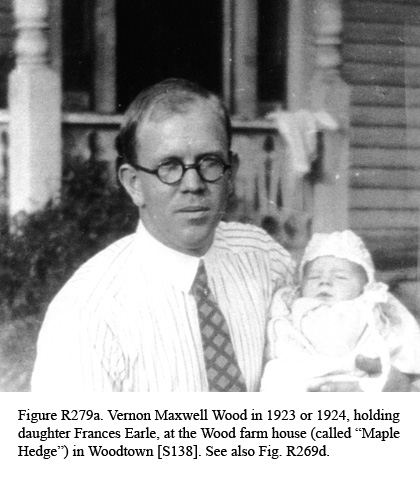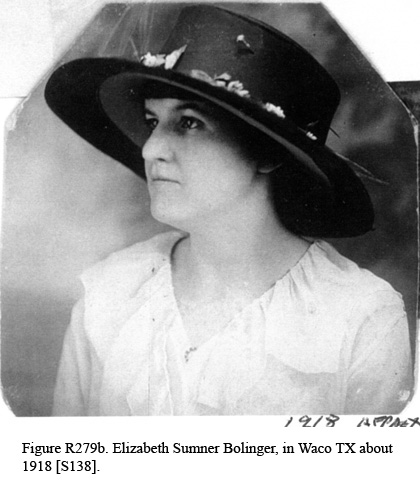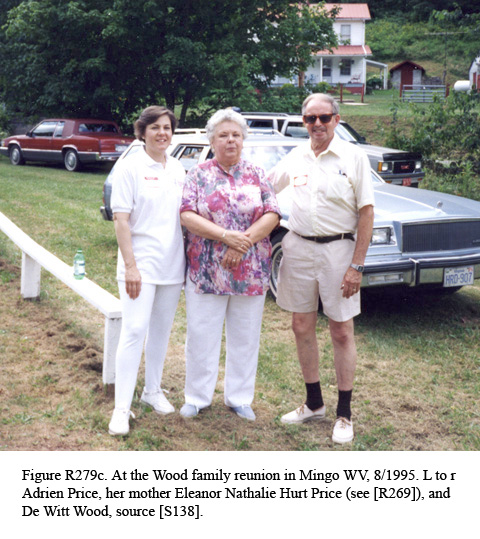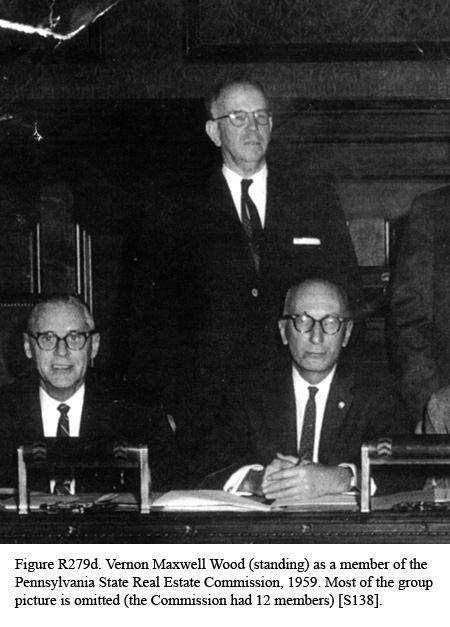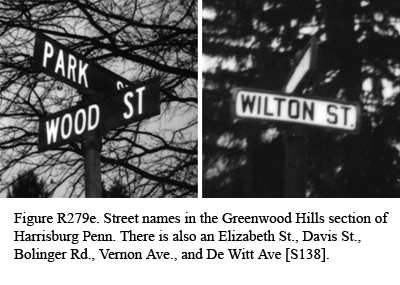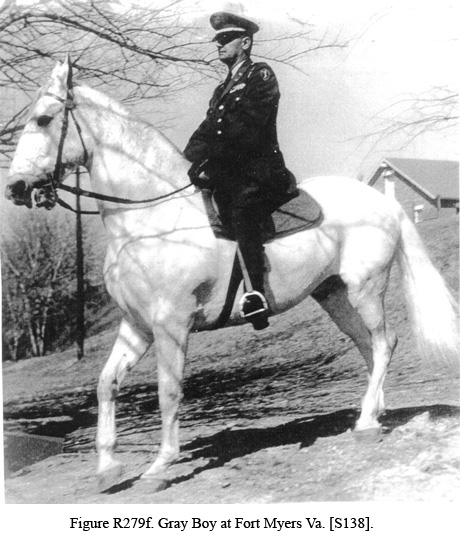R279
Husband: Vernon Maxwell Wood (Fig. R279a)
Father: William Parks Wood [R269]
Mother: Emma Frances (Harnsberger) Wood [R269]
Born: 2/3/1895, in Glen Wilton Va.
Died: 5/20/1965, in Harrisburg Penn.
Wife: Elizabeth Sumner (Bolinger) Wood (Fig. R279b)
Father: De Witt Clinton Bolinger
Mother: Eliza Earle (Harrison) Bolinger
Born: 8/8/1896, in Waco Tex.
Married: 4/16/1919, in Roanoke Va.
Children:
Elizabeth Bolinger Wood, b. 1/24/1921 in Roanoke Va., d. 11/14/1986.
M. 8/26/1944 in Massachusetts to Ernest Edward Champagne (b.
10/28/1919 in Auburn Mass.). Ch. Elizabeth Marie, Clinton Ernest,
Louise Wood, Frederick Stephen, Christopher Dubois.
Frances Earle Wood, b. 2/28/1923 in Roanoke Va., m. 2/15/1944 in
Harrisburg Penn. to Donald Emerson Nulk (b. 9/18/1921). Ch. Betsy
Anne, Vernon Emerson, Carolyn Sumner, Gregory Wood
Vernon Maxwell Wood, Jr., b. 2/25/1925 in Roanoke Va. M. 1st Mary
Elsie Runk (1946, in Harrisburg Penn.), 2nd Louise Rose Bradley of
Pottsville Penn. (in 1950; ch. Vernon Maxwell III, William Gates), 3rd
Helen Serwatka (b. 8/14/1935) on 9/19/1961 (ch. Clayton Harrison,
Edward Thomas), 4th Ellen Beiswenger (b. 10/8/1930) in Camp Hill
Penn. on 9/1/1976. Served in the U. S. Navy Sea Bees in WWII, later
worked in construction (the Wood Construction County) and real
estate (the Vernon Wood Agency and then Thompson Wood Real
Estate Inc.) in the Harrisburg area. Now retired, in Fort Myers Fla.
Ruth Harrison Wood, b. 12/29/1926 in Roanoke Va., m. 8/27/1949 in
Harrisburg Penn. to George Taylor Raffensperger, Jr. (b. 6/18/1925).
Ch. George Taylor III, Timothy Wood, Robert Merrow
De Witt Clinton Wood (Fig. R279c), b. 12/21/1928 in Roanoke Va.,
m. 1/17/1959 in Harrisburg Penn. to Bertha Epperly Jatras (b.
10/26/1929), dau. Victoria Marie. De Witt is source [S138]. He served
in Korea during the Korean War, and subsequently opened a new
“Wood” real estate agency, incorporating the name Wood Realty
Company, Inc., serving as the licensed broker and president.
William Kinnier Wood, b. 1/21/1931 in Clifton Forge Va., m. 1st
6/25/1955 in Harrisburg Penn. to Joanne Hopkins Walker (b.
5/15/1931 in Allentown Penn.). Ch. Karen Elizabeth, William Kinnier
Jr., Robert Hopkins. M. 2nd Ellen Ott. William attended V.P.I., and
served in the Air Force in Korea. William and Ellen, too, operate a real
estate agency in Harrisburg Pa.
(1996) De Witt Clinton Wood [S138] reports that his father, Vernon Maxwell Wood,“...went only to sixth grade in school, later to a business college in Roanoke, Va, became a public stenographer in Washington, D.C.; was a farmer, and founded a real estate agency, WOOD & WAID of Roanoke, Va.” His mother, Elizabeth Sumner Bolinger, was from a prominent Waco Tex. family. Her father was an attorney there and later in San Antonio Tex., and her mother was the daughter of Texas Confederate Brig. General James E. Harrison. (The Earle-Harrison house in Waco, a grand building with Doric columns, is now a museum open to the public.) After her father’s death in 1910 her mother, Eliza Bolinger, and Elizabeth moved to Roanoke Va. Elizabeth attended Sweet Briar College in Virginia, and met Vernon in Glen Wilton while she was visiting her sister Louise, whose husband (James Banks Hudson) owned the Princess Iron Works there. Vernon and Elizabeth were married in 1919.
In the depression Vernon’s business in Roanoke failed and he, Elizabeth, and their children fell back on subsistence farming in Woodtown, Botetourt County, a drastic change in life style. “My folks stood up to the test, the challenge. It was a farming life for [them] for a while. My father was an expert, he felt right at home. We had good crops, milk cows, plenty of chicken and pork and this lady from Waco (my mother) was canning vegetables and fruits faster than my father could pick them. There not being much, if any, household refrigeration in those days, my father would salt cure hams and pork shoulders and make sausage...My mother once told me that as a young girl, she was never taught to cook. Somehow, with help from her sisters-in-law, and there were plenty of them, and my father who was very domestic, she became an excellent cook. She told everyone that since moving to the farm, she had made enough biscuits ‘to go around the world!’” [S138]
Vernon’s brother Emmett Russell, a railroad man, moved to Harrisburg Penn. in the early 1930s, and finding that area somewhat less impacted by the depression than Roanoke, he encouraged his brother to bring his family there. Vernon did, finding work with a real estate firm in the city. Subsequently he founded the Wood Realty Company and the Woodlawn Farm Corporation in Harrisburg, and launched seven housing developments. He was also involved in non-residential city planning and was responsible for elements of the modern face of Harrisburg, such as the riverfront location of the Dauphin County Courthouse. Late in his career he was appointed by Gov. George M. Leader to serve on the Pennsylvania Real Estate Commission (Fig. R279d), and at one time was its Chairman. His sons followed him in the Harrisburg construction and real estate industry.
Vernon was active in the Democratic party, and attended a National Convention (Chicago, 1956, Adlai E. Stevenson) as an Alternate Delegate. He was one of those who received personally addressed copies of Sen. John F. Kennedy’s statement of 1/2/1960, announcing his intention to seek the Democratic presidential nomination.
Vernon used family names for the streets in his first housing development (Fig. R279e), and named one street “Wilton” for his Botetourt County birthplace. In 1955 he had his son Vernon Jr. (who owned the Wood Construction Company) build him a house on the edge of this development, abutting pastures and fields on the other side. The farmer in him had not died, and he “kept a herd of white faced herefords roaming the vacant fields, and raised and shipped O.I.C. (Ohio Improved Chester) pigs for breeding all over the country.” [S138] In 1963 he donated a handsome 10-year-old gray gelding named “Gray Boy” to the U. S. Army unit that conducts funerals in Arlington Cemetery. Quoting from a newspaper interview, “When Mrs. Wood and I saw those beautiful gray horses pulling the caisson in President Kennedy’s funeral...we thought that Gray Boy [should] be a part of that regal-looking team.” Gray Boy passed inspection, and was assigned to the Military District of Washington at Fort Myers Va. (Fig. R279f).
A track of the C&O Railroad cuts through what was Vernon’s father’s farm in Woodtown, and Vernon remembered the passenger train that used to have the grace to stop at the Wood farm and let family members off, if they wished. [S138] recalls, “after my father had his ‘dream home’ built in 1955, he desired to decorate his breezeway, if possible, by acquiring the brass bell that was on the engine of this same passenger steam engine [steam locomotives having been retired by then]. He wrote to the C.&O. office, and in several weeks the bell was hanging in the breezeway; a sight and sound he was so familiar with as a boy...”
With a return to affluence, Elizabeth was able to indulge some tastes that had to be suppressed in Woodtown. These included horse and dog racing, and casinos; her favorite being Caesar’s Palace in Atlantic City. She also wrote music and poetry, and enjoyed stage and musical performances in New York City. “As late as 1985 I would drop in on my mother...and she would be in the living room intensively occupied with boxes of opera programs, letters, scrapbooks, and picture albums of old friends and places. She would tell me about a different one of these occasions each time I would visit her...” [S138].
